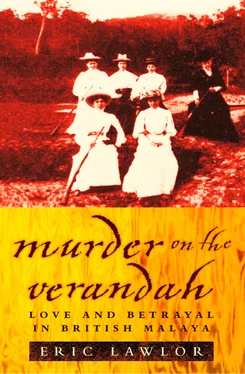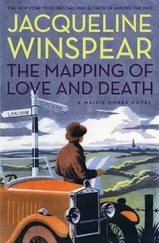The bungalow faced High Street, normally one of Kuala Lumpur’s busiest, but this being a Sunday, it was quiet. What sounds there were were muffled by rain. It had been drizzling much of the day and now, as darkness fell, there was a cloudburst, the rain falling so hard that it obscured the 5-foot-high perimeter hedge that divided the school grounds from the street.
Mrs Proudlock was halfway through her second letter when a rickshaw bearing Steward drew up. Less than half an hour later, he was dead. According to Mrs Proudlock’s version of events, she was not expecting visitors that evening and had been startled by his arrival. Assuming that Steward had come to see her husband, she informed him that Will was having dinner with a colleague who lived on Brickfields Road, a mile and a half away. If Steward wished, she said, he could see him there. When Steward showed himself reluctant to leave, she suggested he sit down. They made small-talk, she said, discussing the rain and its impact on the rising river. For something to say, Mrs Proudlock mentioned religion, asking Steward if he had been to church that evening. He explained that he attended church very rarely. ‘Then you’re like my husband,’ she said, smiling. ‘I’ll show you a book he’s reading.’ She walked to the bookshelf and took down a copy of Leslie Stephen’s An Agnostic’s Apology. She was handing it to Steward when he tried to kiss her. She pushed him away. ‘What are you doing?’ she said. ‘Are you mad?’
Steward answered by grabbing her right wrist and, with his left hand, turned off the light. Frightened now, she tried to break free – and couldn’t. When Steward began to raise her dress, she seized his hand and wrenched it away. ‘He pulled me towards him,’ Mrs Proudlock said. ‘He had one arm around my waist and the other on my left shoulder.’
Steward now tried to force her against the wall and, afraid that she might fall, Mrs Proudlock reached out to steady herself. That is when her hand came in contact with a revolver, belonging to her husband, lying on the table.
‘I think I must have fired twice then,’ she said. Terror had made her mind go blank, she explained, and she couldn’t be more precise. ‘The next thing I remember I was stumbling. I think it was on the steps [of the verandah], but I’m not sure.’
The shots, striking Steward in the neck and chest, were heard by the rickshaw puller whom Steward had told to wait on High Street. Thinking that help might be needed, the puller was approaching the house, he later told the police, when the door burst open and Steward stumbled down the steps and lurched in his direction. Steward was clutching his chest. Fearing for his own life, the puller fled and had made it as far as the street when three more shots rang out. Glancing back, he saw Ethel Proudlock, gun in hand and still wearing her pale-green tea-gown, standing over Steward’s body.
Mrs Proudlock, who claimed to be in a state of shock, said she did not recall following Steward out of the house, nor did she recall shooting him three times in the head while he lay, clinging to life, on the rain-soaked ground. She said it was several minutes before she came to her senses. That was when she called to her cook, who was resting in his room, and ordered him to fetch her husband.
When Proudlock, accompanied by Goodman Ambler, a teaching colleague and the man with whom he had just had dinner, arrived fifteen minutes later, his wife staggered towards him, moaning: ‘Blood, blood. I’ve shot a man.’
‘Whom?’ he demanded.
‘Mr Steward,’ she said.
‘Where is he?’
‘He ran, he ran.’
Mrs Proudlock, her husband would later testify, was incoherent, her dress bore bloodstains, and her hair was in disarray.
When the police arrived, they found Steward, wearing a white suit, brown boots and a mackintosh, lying on his face in a pool of blood. The body was still warm, the Malay Mail reported next day, ‘and the frightful injuries were a testimony to the terrible execution of the Webley revolver … lying some distance away’. According to one police official, there was fresh blood on the Webley’s barrel, and Steward’s watch was still ticking.
The body was removed to the European Hospital in an ambulance cart. Horse-drawn and equipped with rubber tyres – in 1911, still something of a novelty – the cart would have been a tight squeeze for Steward. Just a few months earlier, the Mail had denounced it as absurdly inadequate. It was so short, the paper said, that to accommodate taller patients the back door had to be left open. As if being murdered was not enough, Steward suffered the added indignity of travelling to hospital with his feet protruding.
* * *
Next day the Mail reported that the decapitated body of a Tamil had been found near the Convent of the Holy Infant Jesus and that a Chinese man had drowned himself after stabbing his wife. The paper’s English readers were unlikely to have paid either item much attention. The talking point that Monday, as it would be for weeks to come, was the story on page 5. Under the headline ‘Kuala Lumpur Tragedy; Former Mine Manager Shot Dead; A Distressing Story’, it began: ‘We regret to record a tragedy which created a profound sensation in Kuala Lumpur when the news became generally known this morning.’
Also that Monday, Mrs Proudlock, accompanied by her husband and still thought to be a woman who had killed to protect her honour, made a court appearance lasting all of three minutes. No evidence was presented, the court expressing the wish that she be spared as much embarrassment as possible. The proceedings ended with her being formally charged with causing William Steward’s death – a legal necessity since she herself admitted to killing him. Despite the gravity of the charge, the court took the unusual step of refusing to remand her in custody – no doubt also to spare her feelings – and Mrs Proudlock was released on the payment of two sureties to the amount of $1,000 provided by her father, Robert Charter. A further hearing was fixed for 1st May.
Steward’s funeral at 5.30 that Monday afternoon was a forlorn affair. An obituary in the Mail lauded him as an energetic miner and, more important in British eyes, an enthusiastic rugby player. But neither his energy nor his enthusiasm seem to have gained him much. A mere fifteen people attended his burial in the Venning Road cemetery, a short distance from Kuala Lumpur’s new railway station.
Until a year or two earlier, much ceremony had attended the burial of Britons. At the European Hospital, the coffin was placed on a hand bier and, under escort, was drawn to the cemetery by a detail of splendid-looking Sikh policemen. But in 1909, the police department, for reasons of economy, had ended the practice. Now the bier was drawn by the cemetery’s Javanese gardeners. A bit of a come-down, this; and not everyone was pleased. ‘In common with many other people,’ the Mail complained, ‘we feel the time has come when it should no longer be necessary to call upon Javanese gardeners or anyone else of an alien race or creed to draw the body of a deceased European along public roads to its last resting place.’
Steward’s funeral service was performed by the Revd P. Grahame, a man new to Kuala Lumpur and new as well to presiding over the burials of murder victims. One can imagine his difficulty when recording the event that night in St Mary’s register. Under the heading ‘Cause of Death’, Grahame settled finally for the words ‘bullet wounds’. Surrounded as they are by a long list of deaths due to more conventional causes – malaria, dysentery, convulsions and beri-beri – the words when I saw them in 1996 made my blood run cold.
Steward was a shy man and, beyond turning out for a rugby match once in a while, socialized little. He visited the Selangor Club from time to time and, while there, would sometimes share a drink with William Proudlock. He liked Proudlock as much as he had liked anyone, but for all that, he did not have many friends. In 1911, men in Kuala Lumpur spent a lot of time in one another’s company, partly because there were not many British women, and partly because, most having been to public schools, they enjoyed other men. Steward seems to have been different. For one thing, most of these men drank a lot; Steward was fairly abstentious. For another, in company, he was ill-at-ease. The bluster and heartiness in the Selangor Club’s Long Bar would not have been to his taste. Once in a while, Proudlock prevailed upon him to attend one of his musical ‘at homes’ but, as hard as he tried, he never succeeded in getting Steward to sing. While the others belted out ‘The Road to Mandalay’, Steward would sit silently and stare at his shoes.
Читать дальше












